-
AuthorSearch Results
-
August 16, 2024 at 2:56 pm #7544
In reply to: The Elusive Samuel Housley and Other Family Stories
Youlgreave
The Frost Family and The Big Snow
The Youlgreave parish registers are said to be the most complete and interesting in the country. Starting in 1558, they are still largely intact today.
“The future historian of this parish will find a vast stock of material ready to hand, and if such a work was ever accomplished it would once more be seen how the history of even a remote village is but the history of the nation in little; how national victories were announced on the church bells, and national disasters by the proclamation of a form of prayer…”
J. Charles Cox, Notes on the Churches of Derbyshire, 1877.
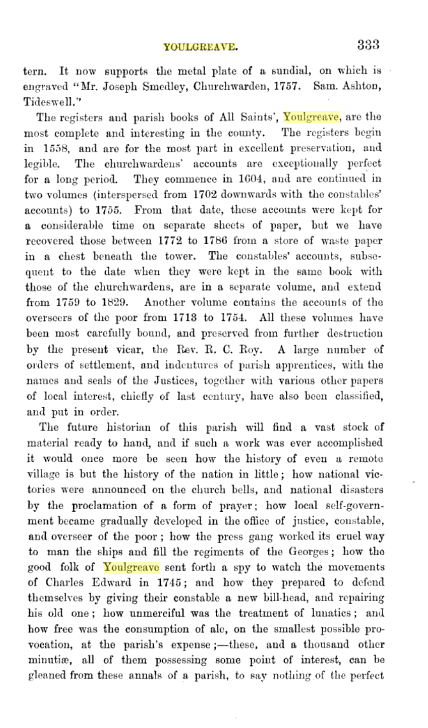
Although the Youlgreave parish registers are available online on microfilm, just the baptisms, marriages and burials are provided on the genealogy websites. However, I found some excerpts from the churchwardens accounts in a couple of old books, The Reliquary 1864, and Notes on Derbyshire Churches 1877.
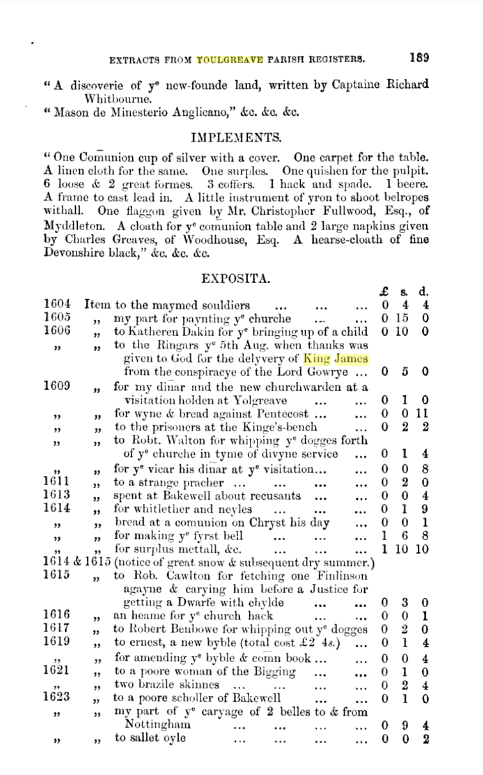
Hannah Keeling, my 4x great grandmother, was born in Youlgreave, Derbyshire, in 1767. In 1791 she married Edward Lees of Hartington, Derbyshire, a village seven and a half miles south west of Youlgreave. Edward and Hannah’s daughter Sarah Lees, born in Hartington in 1808, married Francis Featherstone in 1835. The Featherstone’s were farmers. Their daughter Emma Featherstone married John Marshall from Elton. Elton is just three miles from Youlgreave, and there are a great many Marshall’s in the Youlgreave parish registers, some no doubt distantly related to ours.
Hannah Keeling’s parents were John Keeling 1734-1823, and Ellen Frost 1739-1805, both of Youlgreave.
On the burial entry in the parish registers in Youlgreave in 1823, John Keeling was 88 years old when he died, and was the “late parish clerk”, indicating that my 5x great grandfather played a part in compiling the “best parish registers in the country”. In 1762 John’s father in law John Frost died intestate, and John Keeling, cordwainer, co signed the documents with his mother in law Ann. John Keeling was a shoe maker and a parish clerk.
John Keeling’s father was Thomas Keeling, baptised on the 9th of March 1709 in Youlgreave and his parents were John Keeling and Ann Ashmore. John and Ann were married on the 6th April 1708. Some of the transcriptions have Thomas baptised in March 1708, which would be a month before his parents married. However, this was before the Julian calendar was replaced by the Gregorian calendar, and prior to 1752 the new year started on the 25th of March, therefore the 9th of March 1708 was eleven months after the 6th April 1708.
Thomas Keeling married Dorothy, which we know from the baptism of John Keeling in 1734, but I have not been able to find their marriage recorded. Until I can find my 6x great grandmother Dorothy’s maiden name, I am unable to trace her family further back.
Unfortunately I haven’t found a baptism for Thomas’s father John Keeling, despite that there are Keelings in the Youlgrave registers in the early 1600s, possibly it is one of the few illegible entries in these registers.
The Frosts of Youlgreave
Ellen Frost’s father was John Frost, born in Youlgreave in 1707. John married Ann Staley of Elton in 1733 in Youlgreave.
(Note that this part of the family tree is the Marshall side, but we also have Staley’s in Elton on the Warren side. Our branch of the Elton Staley’s moved to Stapenhill in the mid 1700s. Robert Staley, born 1711 in Elton, died in Stapenhill in 1795. There are many Staley’s in the Youlgreave parish registers, going back to the late 1500s.)
John Frost (my 6x great grandfather), miner, died intestate in 1762 in Youlgreave. Miner in this case no doubt means a lead miner, mining his own land (as John Marshall’s father John was in Elton. On the 1851 census John Marshall senior was mining 9 acres). Ann Frost, as the widow and relict of the said deceased John Frost, claimed the right of administration of his estate. Ann Frost (nee Staley) signed her own name, somewhat unusual for a woman to be able to write in 1762, as well as her son in law John Keeling.
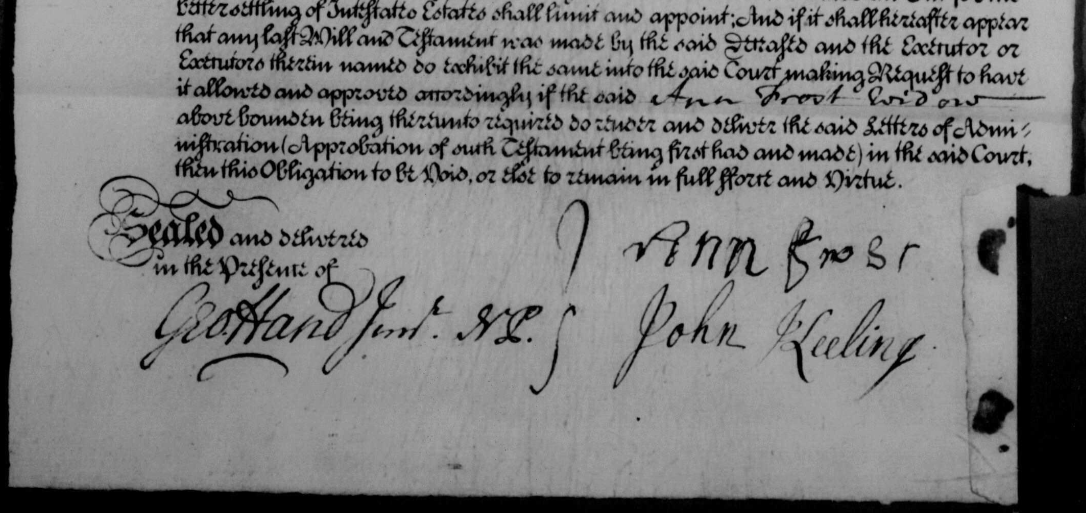
John’s parents were David Frost and Ann. David was baptised in 1665 in Youlgreave. Once again, I have not found a marriage for David and Ann so I am unable to continue further back with her family. Marriages were often held in the parish of the bride, and perhaps those neighbouring parish records from the 1600s haven’t survived.
David’s parents were William Frost and Ellen (or Ellin, or Helen, depending on how the parish clerk chose to spell it). Once again, their marriage hasn’t been found, but was probably in a neighbouring parish.
William Frost’s wife Ellen, my 8x great grandmother, died in Youlgreave in 1713. In her will she left her daughter Catherine £20. Catherine was born in 1665 and was apparently unmarried at the age of 48 in 1713. She named her son Isaac Frost (born in 1662) executor, and left him the remainder of her “goods, chattels and cattle”.
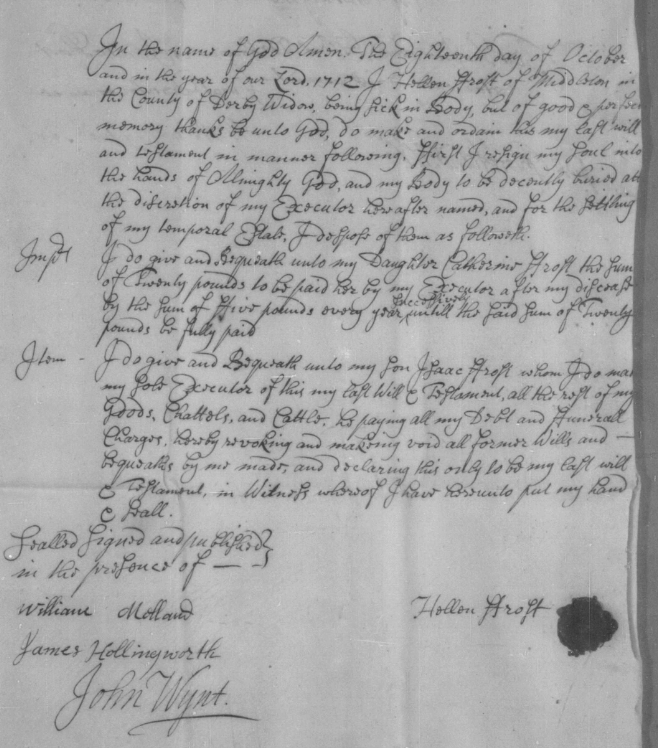
William Frost was baptised in Youlgreave in 1627, his parents were William Frost and Anne.
William Frost senior, husbandman, was probably born circa 1600, and died intestate in 1648 in Middleton, Youlgreave. His widow Anna was named in the document. On the compilation of the inventory of his goods, Thomas Garratt, Will Melland and A Kidiard are named.(Husbandman: The old word for a farmer below the rank of yeoman. A husbandman usually held his land by copyhold or leasehold tenure and may be regarded as the ‘average farmer in his locality’. The words ‘yeoman’ and ‘husbandman’ were gradually replaced in the later 18th and 19th centuries by ‘farmer’.)
Unable to find a baptism for William Frost born circa 1600, I read through all the pages of the Youlgreave parish registers from 1558 to 1610. Despite the good condition of these registers, there are a number of illegible entries. There were three Frost families baptising children during this timeframe and one of these is likely to be Willliam’s.
Baptisms:
1581 Eliz Frost, father Michael.
1582 Francis f Michael. (must have died in infancy)
1582 Margaret f William.
1585 Francis f Michael.
1586 John f Nicholas.
1588 Barbara f Michael.
1590 Francis f Nicholas.
1591 Joane f Michael.
1594 John f Michael.
1598 George f Michael.
1600 Fredericke (female!) f William.Marriages in Youlgreave which could be William’s parents:
1579 Michael Frost Eliz Staley
1587 Edward Frost Katherine Hall
1600 Nicholas Frost Katherine Hardy.
1606 John Frost Eliz Hanson.Michael Frost of Youlgreave is mentioned on the Derbyshire Muster Rolls in 1585.
(Muster records: 1522-1649. The militia muster rolls listed all those liable for military service.)
Frideswide:
A burial is recorded in 1584 for Frideswide Frost (female) father Michael. As the father is named, this indicates that Frideswide was a child.
(Frithuswith, commonly Frideswide c. 650 – 19 October 727), was an English princess and abbess. She is credited as the foundress of a monastery later incorporated into Christ Church, Oxford. She was the daughter of a sub-king of a Merica named Dida of Eynsham whose lands occupied western Oxfordshire and the upper reaches of the River Thames.)
An unusual name, and certainly very different from the usual names of the Frost siblings. As I did not find a baptism for her, I wondered if perhaps she died too soon for a baptism and was given a saints name, in the hope that it would help in the afterlife, given the beliefs of the times. Or perhaps it wasn’t an unusual name at the time in Youlgreave. A Fridesweda Gilbert was buried in Youlgreave in 1604, the spinster daughter of Francis Gilbert. There is a small brass effigy in the church, underneath is written “Frideswide Gilbert to the grave, Hath resigned her earthly part…”
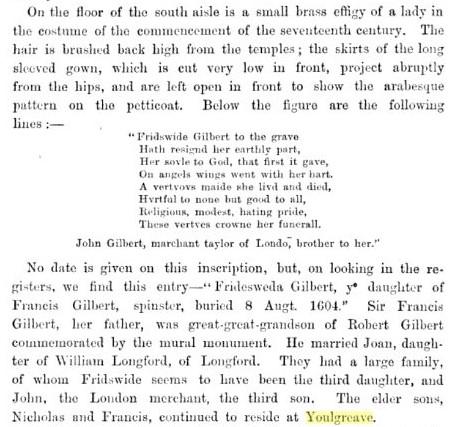
J. Charles Cox, Notes on the Churches of Derbyshire, 1877.
King James
A parish register entry in 1603:
“1603 King James of Skottland was proclaimed kinge of England, France and Ireland at Bakewell upon Monday being the 29th of March 1603.” (March 1603 would be 1604, because of the Julian calendar in use at the time.)
The Big Snow
“This year 1614/5 January 16th began the greatest snow whichever fell uppon the earth within man’s memorye. It covered the earth fyve quarters deep uppon the playne. And for heaps or drifts of snow, they were very deep; so that passengers both horse or foot passed over yates, hedges and walles. ….The spring was so cold and so late that much cattel was in very great danger and some died….”
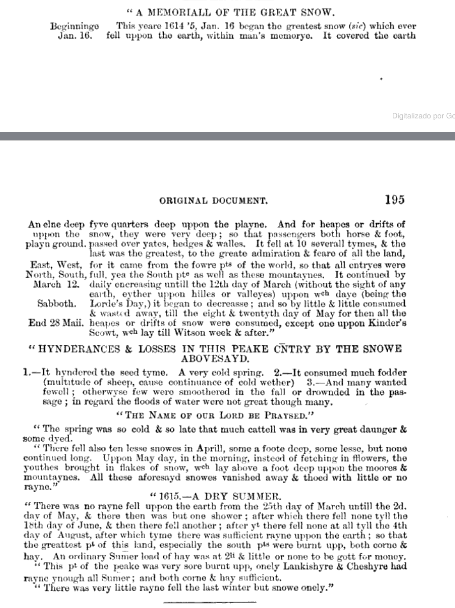
From the Youlgreave parish registers.
Our ancestor William Frost born circa 1600 would have been a teenager during the big snow.
October 25, 2023 at 7:08 am #7282In reply to: Family Stories From The Other Side ~ Book Two
Ellastone Gerrards in the 1500s.
John Gerrard 1633-1681 was born and died in Ellastone.
Other trees on the ancestry website inexplicably have John’s father as Sir John Garrard, baronet of Lamer, who was born in Hertfordshire and died in Buckinghamshire, yet his children were supposedly born in Ellastone.
Fortunately the Ellastone parish records begin in 1537. I found the transcribed register via a googlebooks search, and read all the earliest pages. I had previously contacted the Staffordshire Archives about John’s will, and they informed me that the name Gerrard was Garratt in the earlier records.
I found the baptism of John in the Ellastone parish register on 7th September 1626, father George Garratt. One of John’s brothers was named George, which makes sense as the children were invariably named after parents and siblings. However, John born in 1626 died in 1628. Another son named John was baptised in 1633.
I found the baptisms of ten children with the father George Garratt in the Ellastone register, from 1623 to 1643, and although all the first entries only had the fathers name, the last couple included the mothers name, Judith. George Garratt was a churchwarden in Ellastone in 1627.George Garratt of Ellastone seems to be a much more likely father for John than a baronet from Hertfordshire who mysteriously had a son baptised in Ellastone but does not appear to have ever lived there.
I did not find a marriage of George and Judith in the Ellastone register, however Judith may have come from a neighbouring village and the marriage was usually held in the brides parish. The wedding was probably circa 1622.
George was baptised in Ellastone on the 19th March 1595. Some of the transcriptions say March 1794, some say 1795. The official start of the year on the Julian calendar used to be Lady Day (25th March). This was changed in 1752.
His father was Rycharde Garrarde. Rycharde married Agnes Bothom in Ellastone on the 29th September 1594. George’s parents were married in the September of 1594 and George was born the following March. On the old calendar, March came after September.
George died in 1669 in Ellastone. He was my 10X great grandfather. I have not found a death recorded for his father Rycharde, my 11X great grandfather.
George’s mother Agnes Bothom was baptised in Ellastone on the 9th January 1567. Her father was John Bothom. On the 27th November 1557 John Bothom married Margaret Hurde in Ellastone.
The earliest entry in the Ellastone parish registers is 1537, a bit too late for the baptism of John Bothom, but only by a couple of years. John Bothom and his wife Agnes were probably born around 1535. Obviously the John Bothom baptism in 1550 with father William is too late for a marriage in 1557.
June 6, 2022 at 9:17 am #6301In reply to: The Elusive Samuel Housley and Other Family Stories
The Warrens of Stapenhill
There were so many Warren’s in Stapenhill that it was complicated to work out who was who. I had gone back as far as Samuel Warren marrying Catherine Holland, and this was as far back as my cousin Ian Warren had gone in his research some decades ago as well. The Holland family from Barton under Needwood are particularly interesting, and will be a separate chapter.
Stapenhill village by John Harden:
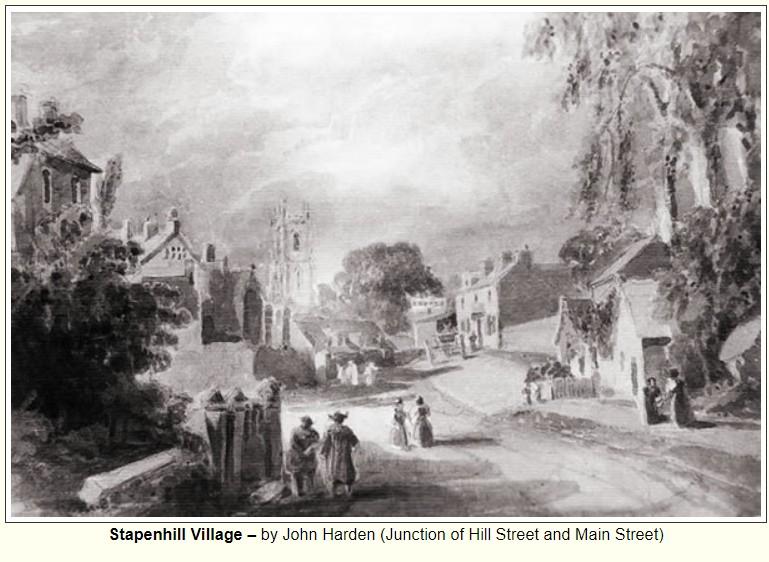
Resuming the research on the Warrens, Samuel Warren 1771-1837 married Catherine Holland 1775-1861 in 1795 and their son Samuel Warren 1800-1882 married Elizabeth Bridge, whose childless brother Benjamin Bridge left the Warren Brothers Boiler Works in Newhall to his nephews, the Warren brothers.
Samuel Warren and Catherine Holland marriage licence 1795:
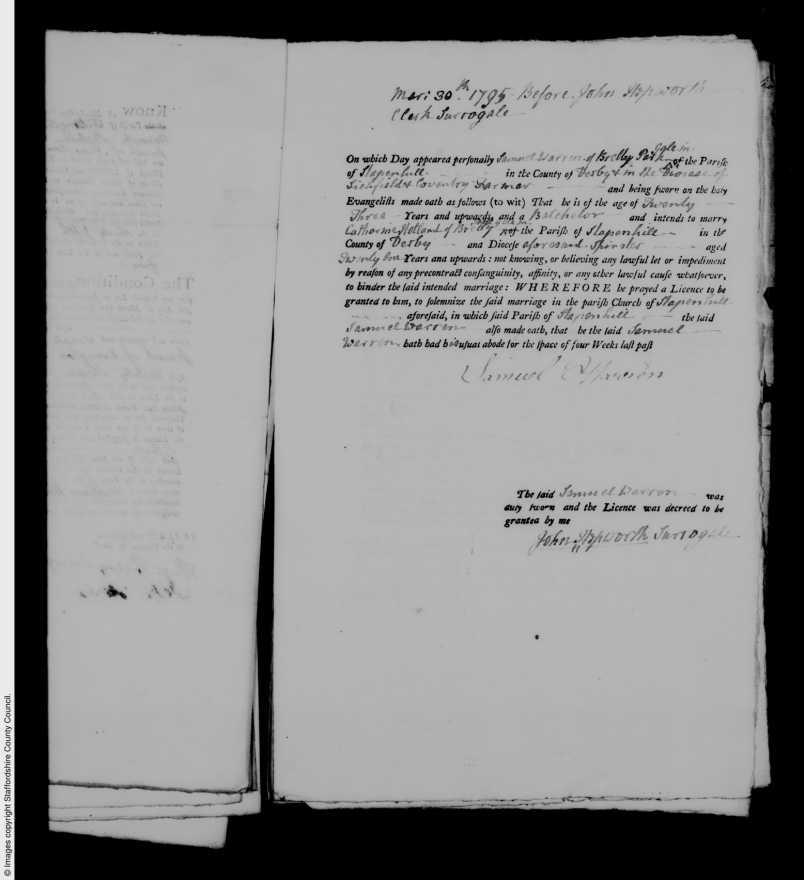
Samuel (born 1771) was baptised at Stapenhill St Peter and his parents were William and Anne Warren. There were at least three William and Ann Warrens in town at the time. One of those William’s was born in 1744, which would seem to be the right age to be Samuel’s father, and one was born in 1710, which seemed a little too old. Another William, Guiliamos Warren (Latin was often used in early parish registers) was baptised in Stapenhill in 1729.
Stapenhill St Peter:
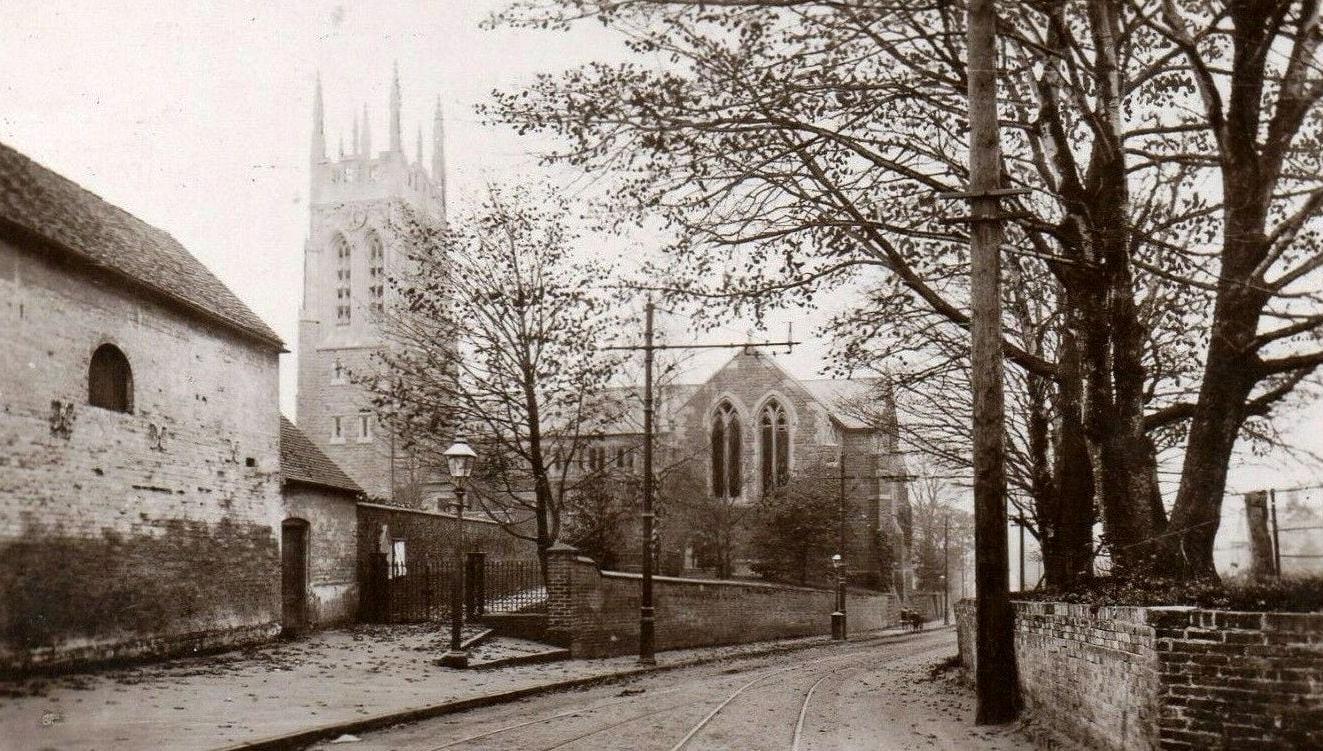
William Warren (born 1744) appeared to have been born several months before his parents wedding. William Warren and Ann Insley married 16 July 1744, but the baptism of William in 1744 was 24 February. This seemed unusual ~ children were often born less than nine months after a wedding, but not usually before the wedding! Then I remembered the change from the Julian calendar to the Gregorian calendar in 1752. Prior to 1752, the first day of the year was Lady Day, March 25th, not January 1st. This meant that the birth in February 1744 was actually after the wedding in July 1744. Now it made sense. The first son was named William, and he was born seven months after the wedding.
William born in 1744 died intestate in 1822, and his wife Ann made a legal claim to his estate. However he didn’t marry Ann Holland (Ann was Catherines Hollands sister, who married Samuel Warren the year before) until 1796, so this William and Ann were not the parents of Samuel.
It seemed likely that William born in 1744 was Samuels brother. William Warren and Ann Insley had at least eight children between 1744 and 1771, and it seems that Samuel was their last child, born when William the elder was 61 and his wife Ann was 47.
It seems it wasn’t unusual for the Warren men to marry rather late in life. William Warren’s (born 1710) parents were William Warren and Elizabeth Hatterton. On the marriage licence in 1702/1703 (it appears to say 1703 but is transcribed as 1702), William was a 40 year old bachelor from Stapenhill, which puts his date of birth at 1662. Elizabeth was considerably younger, aged 19.
William Warren and Elizabeth Hatterton marriage licence 1703:
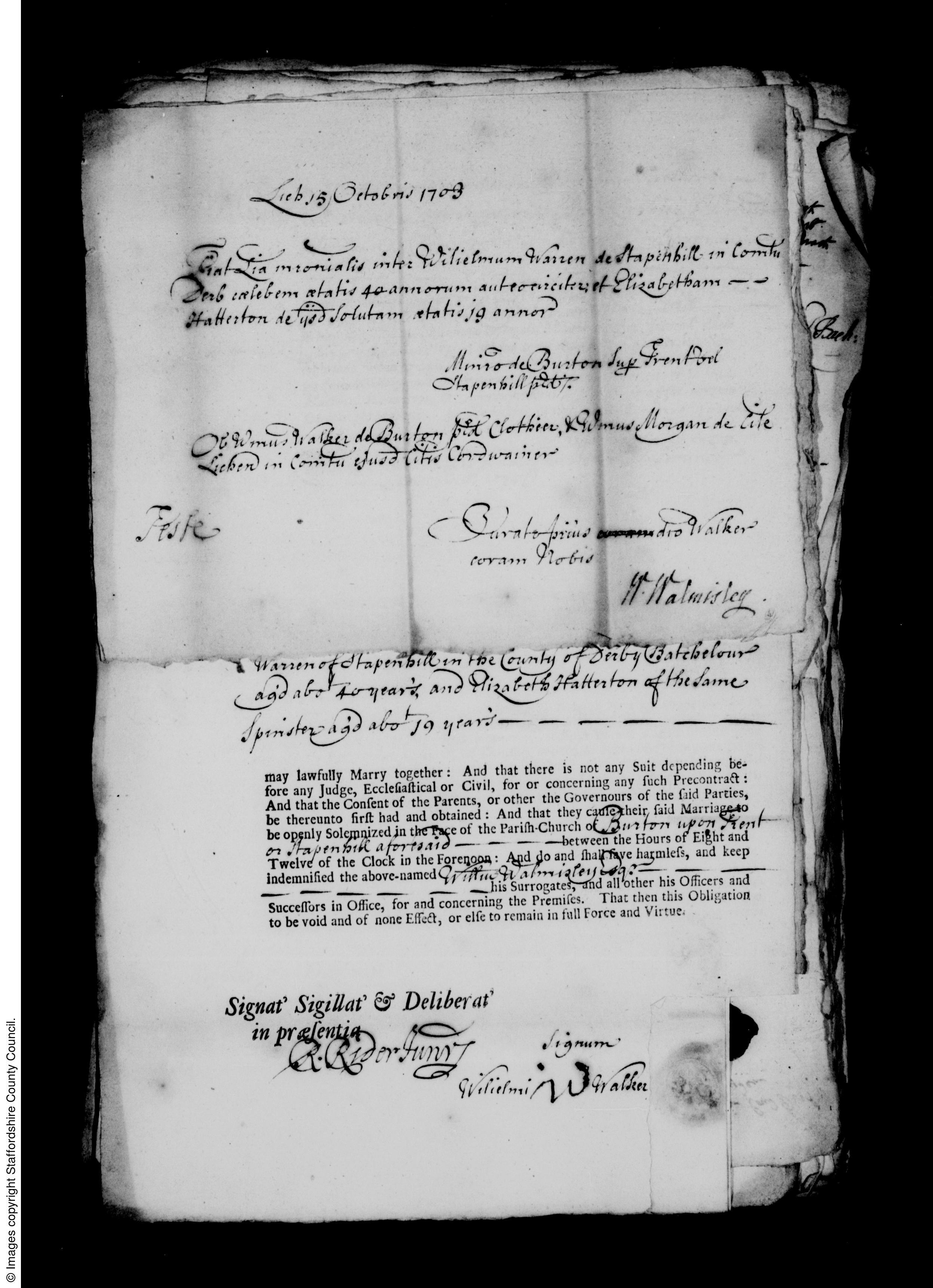
These Warren’s were farmers, and they were literate and able to sign their own names on various documents. This is worth noting, as most made the mark of an X.
I found three Warren and Holland marriages. One was Samuel Warren and Catherine Holland in 1795, then William Warren and Ann Holland in 1796. William Warren and Ann Hollands daughter born in 1799 married John Holland in 1824.
Elizabeth Hatterton (wife of William Warren who was born circa 1662) was born in Burton upon Trent in 1685. Her parents were Edward Hatterton 1655-1722, and Sara.
A page from the 1722 will of Edward Hatterton:
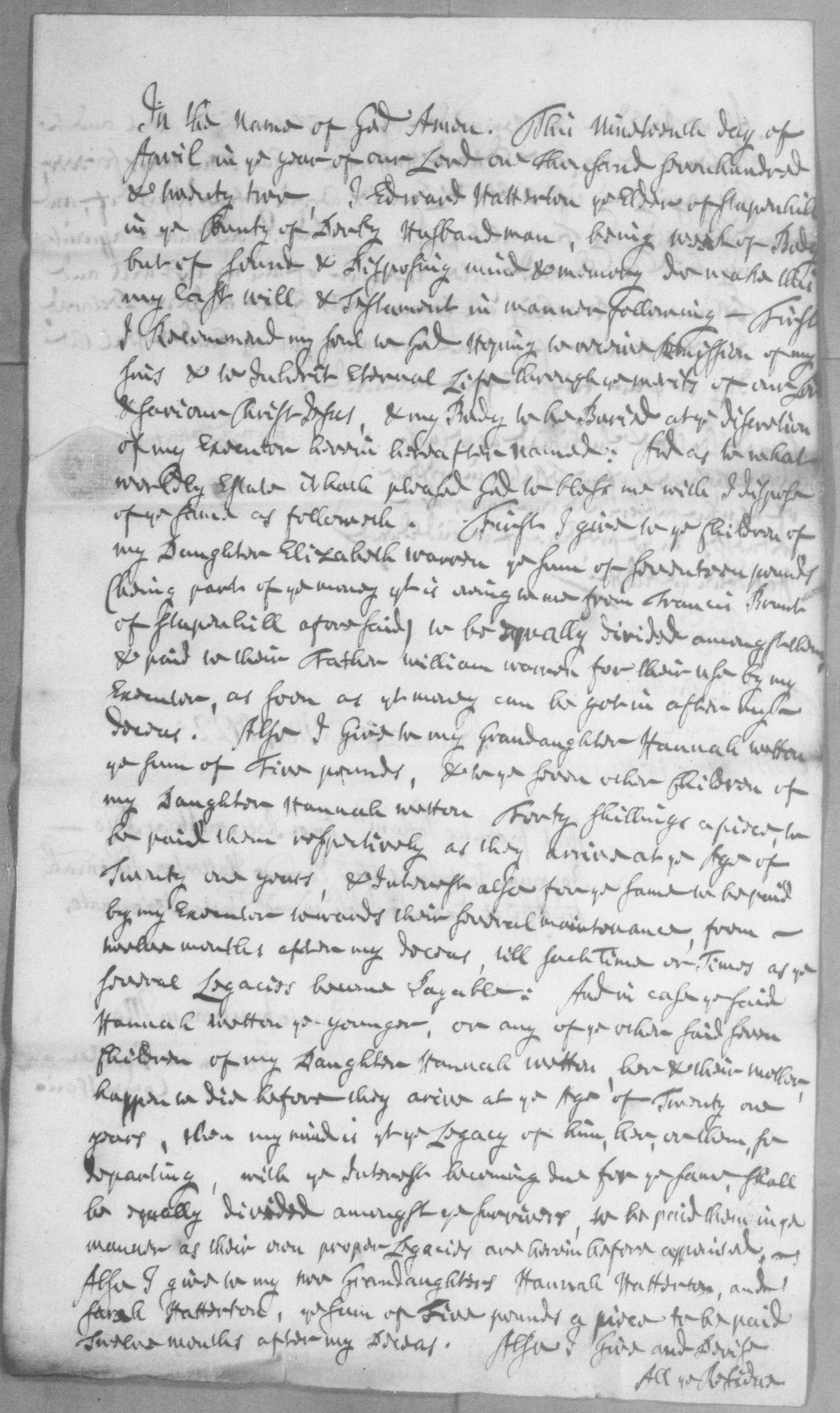
The earliest Warren I found records for was William Warren who married Elizabeth Hatterton in 1703. The marriage licence states his age as 40 and that he was from Stapenhill, but none of the Stapenhill parish records online go back as far as 1662. On other public trees on ancestry websites, a birth record from Suffolk has been chosen, probably because it was the only record to be found online with the right name and date. Once again, I don’t think that is correct, and perhaps one day I’ll find some earlier Stapenhill records to prove that he was born in locally.
Subsequently, I found a list of the 1662 Hearth Tax for Stapenhill. On it were a number of Warrens, three William Warrens including one who was a constable. One of those William Warrens had a son he named William (as they did, hence the number of William Warrens in the tree) the same year as this hearth tax list.
But was it the William Warren with 2 chimneys, the one with one chimney who was too poor to pay it, or the one who was a constable?
from the list:
Will. Warryn 2
Richard Warryn 1
William Warren Constable
These names are not payable by Act:
Will. Warryn 1
Richard Warren John Watson
over seers of the poore and churchwardensThe Hearth Tax:
via wiki:
In England, hearth tax, also known as hearth money, chimney tax, or chimney money, was a tax imposed by Parliament in 1662, to support the Royal Household of King Charles II. Following the Restoration of the monarchy in 1660, Parliament calculated that the Royal Household needed an annual income of £1,200,000. The hearth tax was a supplemental tax to make up the shortfall. It was considered easier to establish the number of hearths than the number of heads, hearths forming a more stationary subject for taxation than people. This form of taxation was new to England, but had precedents abroad. It generated considerable debate, but was supported by the economist Sir William Petty, and carried through the Commons by the influential West Country member Sir Courtenay Pole, 2nd Baronet (whose enemies nicknamed him “Sir Chimney Poll” as a result). The bill received Royal Assent on 19 May 1662, with the first payment due on 29 September 1662, Michaelmas.
One shilling was liable to be paid for every firehearth or stove, in all dwellings, houses, edifices or lodgings, and was payable at Michaelmas, 29 September and on Lady Day, 25 March. The tax thus amounted to two shillings per hearth or stove per year. The original bill contained a practical shortcoming in that it did not distinguish between owners and occupiers and was potentially a major burden on the poor as there were no exemptions. The bill was subsequently amended so that the tax was paid by the occupier. Further amendments introduced a range of exemptions that ensured that a substantial proportion of the poorer people did not have to pay the tax.Indeed it seems clear that William Warren the elder came from Stapenhill and not Suffolk, and one of the William Warrens paying hearth tax in 1662 was undoubtedly the father of William Warren who married Elizabeth Hatterton.
April 12, 2022 at 8:13 am #6290In reply to: The Elusive Samuel Housley and Other Family Stories
Leicestershire Blacksmiths
The Orgill’s of Measham led me further into Leicestershire as I traveled back in time.
I also realized I had uncovered a direct line of women and their mothers going back ten generations:
myself, Tracy Edwards 1957-
my mother Gillian Marshall 1933-
my grandmother Florence Warren 1906-1988
her mother and my great grandmother Florence Gretton 1881-1927
her mother Sarah Orgill 1840-1910
her mother Elizabeth Orgill 1803-1876
her mother Sarah Boss 1783-1847
her mother Elizabeth Page 1749-
her mother Mary Potter 1719-1780
and her mother and my 7x great grandmother Mary 1680-You could say it leads us to the very heart of England, as these Leicestershire villages are as far from the coast as it’s possible to be. There are countless other maternal lines to follow, of course, but only one of mothers of mothers, and ours takes us to Leicestershire.
The blacksmiths
Sarah Boss was the daughter of Michael Boss 1755-1807, a blacksmith in Measham, and Elizabeth Page of nearby Hartshorn, just over the county border in Derbyshire.
An earlier Michael Boss, a blacksmith of Measham, died in 1772, and in his will he left the possession of the blacksmiths shop and all the working tools and a third of the household furniture to Michael, who he named as his nephew. He left his house in Appleby Magna to his wife Grace, and five pounds to his mother Jane Boss. As none of Michael and Grace’s children are mentioned in the will, perhaps it can be assumed that they were childless.
The will of Michael Boss, 1772, Measham:

Michael Boss the uncle was born in Appleby Magna in 1724. His parents were Michael Boss of Nelson in the Thistles and Jane Peircivall of Appleby Magna, who were married in nearby Mancetter in 1720.
Information worth noting on the Appleby Magna website:
In 1752 the calendar in England was changed from the Julian Calendar to the Gregorian Calendar, as a result 11 days were famously “lost”. But for the recording of Church Registers another very significant change also took place, the start of the year was moved from March 25th to our more familiar January 1st.
Before 1752 the 1st day of each new year was March 25th, Lady Day (a significant date in the Christian calendar). The year number which we all now use for calculating ages didn’t change until March 25th. So, for example, the day after March 24th 1750 was March 25th 1751, and January 1743 followed December 1743.
This March to March recording can be seen very clearly in the Appleby Registers before 1752. Between 1752 and 1768 there appears slightly confused recording, so dates should be carefully checked. After 1768 the recording is more fully by the modern calendar year.Michael Boss the uncle married Grace Cuthbert. I haven’t yet found the birth or parents of Grace, but a blacksmith by the name of Edward Cuthbert is mentioned on an Appleby Magna history website:
An Eighteenth Century Blacksmith’s Shop in Little Appleby
by Alan RobertsCuthberts inventory
The inventory of Edward Cuthbert provides interesting information about the household possessions and living arrangements of an eighteenth century blacksmith. Edward Cuthbert (als. Cutboard) settled in Appleby after the Restoration to join the handful of blacksmiths already established in the parish, including the Wathews who were prominent horse traders. The blacksmiths may have all worked together in the same shop at one time. Edward and his wife Sarah recorded the baptisms of several of their children in the parish register. Somewhat sadly three of the boys named after their father all died either in infancy or as young children. Edward’s inventory which was drawn up in 1732, by which time he was probably a widower and his children had left home, suggests that they once occupied a comfortable two-storey house in Little Appleby with an attached workshop, well equipped with all the tools for repairing farm carts, ploughs and other implements, for shoeing horses and for general ironmongery.
Edward Cuthbert born circa 1660, married Joane Tuvenet in 1684 in Swepston cum Snarestone , and died in Appleby in 1732. Tuvenet is a French name and suggests a Huguenot connection, but this isn’t our family, and indeed this Edward Cuthbert is not likely to be Grace’s father anyway.
Michael Boss and Elizabeth Page appear to have married twice: once in 1776, and once in 1779. Both of the documents exist and appear correct. Both marriages were by licence. They both mention Michael is a blacksmith.
Their first daughter, Elizabeth, was baptized in February 1777, just nine months after the first wedding. It’s not known when she was born, however, and it’s possible that the marriage was a hasty one. But why marry again three years later?
But Michael Boss and Elizabeth Page did not marry twice.
Elizabeth Page from Smisby was born in 1752 and married Michael Boss on the 5th of May 1776 in Measham. On the marriage licence allegations and bonds, Michael is a bachelor.
Baby Elizabeth was baptised in Measham on the 9th February 1777. Mother Elizabeth died on the 18th February 1777, also in Measham.
In 1779 Michael Boss married another Elizabeth Page! She was born in 1749 in Hartshorn, and Michael is a widower on the marriage licence allegations and bonds.
Hartshorn and Smisby are neighbouring villages, hence the confusion. But a closer look at the documents available revealed the clues. Both Elizabeth Pages were literate, and indeed their signatures on the marriage registers are different:
Marriage of Michael Boss and Elizabeth Page of Smisby in 1776:

Marriage of Michael Boss and Elizabeth Page of Harsthorn in 1779:

Not only did Michael Boss marry two women both called Elizabeth Page but he had an unusual start in life as well. His uncle Michael Boss left him the blacksmith business and a third of his furniture. This was all in the will. But which of Uncle Michaels brothers was nephew Michaels father?
The only Michael Boss born at the right time was in 1750 in Edingale, Staffordshire, about eight miles from Appleby Magna. His parents were Thomas Boss and Ann Parker, married in Edingale in 1747. Thomas died in August 1750, and his son Michael was baptised in the December, posthumus son of Thomas and his widow Ann. Both entries are on the same page of the register.

Ann Boss, the young widow, married again. But perhaps Michael and his brother went to live with their childless uncle and aunt, Michael Boss and Grace Cuthbert.
The great grandfather of Michael Boss (the Measham blacksmith born in 1850) was also Michael Boss, probably born in the 1660s. He died in Newton Regis in Warwickshire in 1724, four years after his son (also Michael Boss born 1693) married Jane Peircivall. The entry on the parish register states that Michael Boss was buried ye 13th Affadavit made.
I had not seen affadavit made on a parish register before, and this relates to the The Burying in Woollen Acts 1666–80. According to Wikipedia:
“Acts of the Parliament of England which required the dead, except plague victims and the destitute, to be buried in pure English woollen shrouds to the exclusion of any foreign textiles. It was a requirement that an affidavit be sworn in front of a Justice of the Peace (usually by a relative of the deceased), confirming burial in wool, with the punishment of a £5 fee for noncompliance. Burial entries in parish registers were marked with the word “affidavit” or its equivalent to confirm that affidavit had been sworn; it would be marked “naked” for those too poor to afford the woollen shroud. The legislation was in force until 1814, but was generally ignored after 1770.”
Michael Boss buried 1724 “Affadavit made”:

Elizabeth Page‘s father was William Page 1717-1783, a wheelwright in Hartshorn. (The father of the first wife Elizabeth was also William Page, but he was a husbandman in Smisby born in 1714. William Page, the father of the second wife, was born in Nailstone, Leicestershire, in 1717. His place of residence on his marriage to Mary Potter was spelled Nelson.)
Her mother was Mary Potter 1719- of nearby Coleorton. Mary’s father, Richard Potter 1677-1731, was a blacksmith in Coleorton.
A page of the will of Richard Potter 1731:

Richard Potter states: “I will and order that my son Thomas Potter shall after my decease have one shilling paid to him and no more.” As he left £50 to each of his daughters, one can’t help but wonder what Thomas did to displease his father.
Richard stipulated that his son Thomas should have one shilling paid to him and not more, for several good considerations, and left “the house and ground lying in the parish of Whittwick in a place called the Long Lane to my wife Mary Potter to dispose of as she shall think proper.”
His son Richard inherited the blacksmith business: “I will and order that my son Richard Potter shall live and be with his mother and serve her duly and truly in the business of a blacksmith, and obey and serve her in all lawful commands six years after my decease, and then I give to him and his heirs…. my house and grounds Coulson House in the Liberty of Thringstone”
Richard wanted his son John to be a blacksmith too: “I will and order that my wife bring up my son John Potter at home with her and teach or cause him to be taught the trade of a blacksmith and that he shall serve her duly and truly seven years after my decease after the manner of an apprentice and at the death of his mother I give him that house and shop and building and the ground belonging to it which I now dwell in to him and his heirs forever.”
To his daughters Margrett and Mary Potter, upon their reaching the age of one and twenty, or the day after their marriage, he leaves £50 each. All the rest of his goods are left to his loving wife Mary.
An inventory of the belongings of Richard Potter, 1731:

Richard Potters father was also named Richard Potter 1649-1719, and he too was a blacksmith.
Richard Potter of Coleorton in the county of Leicester, blacksmith, stated in his will: “I give to my son and daughter Thomas and Sarah Potter the possession of my house and grounds.”
He leaves ten pounds each to his daughters Jane and Alice, to his son Francis he gives five pounds, and five shillings to his son Richard. Sons Joseph and William also receive five shillings each. To his daughter Mary, wife of Edward Burton, and her daughter Elizabeth, he gives five shillings each. The rest of his good, chattels and wordly substance he leaves equally between his son and daugter Thomas and Sarah. As there is no mention of his wife, it’s assumed that she predeceased him.
The will of Richard Potter, 1719:

Richard Potter’s (1649-1719) parents were William Potter and Alse Huldin, both born in the early 1600s. They were married in 1646 at Breedon on the Hill, Leicestershire. The name Huldin appears to originate in Finland.
William Potter was a blacksmith. In the 1659 parish registers of Breedon on the Hill, William Potter of Breedon blacksmith buryed the 14th July.
October 23, 2019 at 9:27 am #4858In reply to: Pop﹡in People Tribulations
“Well, where were we?” Jerk took the articles where he left them when he got up to check the price on one lacking a barcode.
The blip blip resumed, with the impatient twitching lady pouncing on the items as soon as they passed the scanning, to cram them into her compostable bag.Days were stretching in ennui, and he started to feel like an android. At least, the rhythmical blips and “Have a good day, thank you for your purchase” were now part of his muscle memory, and didn’t require much paying attention to.
He’d renewed the yearly fee to maintain his group website yesterday, but he wasn’t sure why he did it. There were still the occasional posts on the groups he was managing, but the buzz had died already. People had moved to other things, autumn for one. Really, what was the point of maintaining it for 3 posts a week (and those were good weeks, of course not counting the spam).
There was fun occasionally, but more often than not, there were harangues.
He wondered what archetype he was in his life story; maybe he was just a background character, and that was fine, so long as he wasn’t just a supporting cast to another megalomaniac politician.The apartment blocks were he was living were awfully quiet. His neighbours were still in travel, he wondered how they could afford it. Lucinda was completely immersed in her writing courses, and Fabio was still around amazingly – Lucinda didn’t look like she could even care of herself, so a dog… Meanwhile, the town council was envisaging a “refresh” of their neighborhood, but he had strong suspicion it was another real-estate development scheme. Only time would tell. He wasn’t in a rush to jump to the conclusion of an expropriation drama —leave that to Luce.
Friday would have been her 60th brithday (funny typo he thought). Their dead friend’s birthday would still crop up in his calendar, and he liked that they were still these connections at least. Did she move on, he wondered. Sometimes her energy felt present, and Lucinda would argue she was helping her in her writing endeavours. He himself wasn’t sure, those synchronicities were nice enough without the emphatic spiritualist extrapolations.
“Happy birthday Granola.” he said.

Another crack appeared on the red crystal into which Granola was stuck for what felt like ages.
“About time!” she said. “I wonder if they have all forgotten about me now.”
She looked closely at the crack. There was an opening, invisible, the size of an atom. But maybe, just maybe, it was just enough for her to squeeze in. She leaned in and focused on the little dot to escape.
November 21, 2016 at 3:25 am #4188In reply to: Cakletown and the Lone Chancers of Custard
There has been a satisfying sense of getting back to normality, after Bea had moved into her personal equivalent of a Witsness Protection Program. (She had to keep the typo for clueing value).
That satisfying feeling did last, for somewhat longer than she had expected at first. Not by minutes, actually, but by months, if the old calendar was to be trusted.
She had swept a lot of the strange, mildly irritating, or concerning, or revolting occurrences under the carpet, like the old dust mites and bunnies, and discarded graham cracker’s packages. She didn’t mind the crunchy sounds of her carpets.
So, she would have been hard-pressed to tell what was the event that made her realise something was not as it should have been. There maybe wasn’t an event at all, maybe it was just the subtle movements of the heart itself.At first, she had discarded the parting words of the techromancer as another type of mess-with-your-head mumbo-jumbo.
It was only last night that she had remembered something about her youth —she could hardly tell if it was a memory of an alternate timeline, or a true event, that really didn’t matter. For a little while, she had been drown into the feeling of innocence, kindness and expansion, the taste of which she had not felt for very long.Out of the unexpectedness, out of the emptiness, she remembered the poem of Custard the Dragon. She was suddenly struck by an entire dimension that was opened through reminisced words “But Custard cried for a nice safe cage.”
Where had her inner dragon gone? Where did The Custard that gobbled a pirate go?
September 17, 2015 at 2:14 am #3778In reply to: The Hosts of Mars
It was a quiet day in the mines.
Godfrey’s teams were operating at less than 10% of the usual. Most of the Indian guys who worked there had taken unpaid leaves for the observance of the Ganesh festival.It was all a bit silly, come to think about it, for so many reasons.
One obviously, was that the dates were aligned on Earth’s calendar, for supposedly practical reasons, but which had nothing to do with the environment they were living in now. What good was a lunar calendar when Mars had two main moons, the lovely named Fear (Phobos) and Dread (Deimos), and of course completely different day times and years.
Anyhow, that wasn’t the least of the incoherences. You’d normally have to find a natural body of water to immerse the elephant clay statues. Good luck with that on Mars. But there was no stopping the rituals to find ways to survive. He’d heard an artificial pool would be temporarily erected at the Matrimandir to allow for the ritual to be performed.
A waste of good water, if you asked him.The only good thing about it was that there was more calm than usual, mostly robots diligently carving the walls, and harvesting the yellow stones.
The day before, there had been an unusual ruckus after a heated speech by the Head Nutter of the Religious Nuts, the old wrinkled as a prune Mother Shirley. She spoke of dread and doom, and having to repent and all. Gosh, did she put on a show.
He smirked. All that was missing was a human sacrifice, and they would be irrevocably back to the good old ways of the religious fanatics…Even his Hindu friends seemed to have been affected and shown a renewed fervour at their own rituals. After all, their Lord Ganesh was supposed to remove obstacles. Or well, truth is, He was also supposed to create obstacles for the demons. But you’d never know whether you were on his good side or not.
Maybe the unusualness of that day gave him some heightened attention, but Godfrey started to notice some other strange patterns.
The Finnleys on duty were acting glitchy this morning. Looking through the console, he’d noticed there were some logs for the past days’ activity missing, and an unusual activity around some of the old tunnels which were used for temporary storage of the sulphur’s crates.An irrational doubt started to creep on him, enhanced by the feeling of unusually low activity inside the dusty bowels of the red planet.
There was really no reason to worry, he tried to reassure himself, but as he’d liked to repeat, better be safe than sorry.He pushed the intercall button and called for an emergency evacuation drill.
September 11, 2015 at 3:11 am #3765In reply to: The Hosts of Mars
After a night of restless sleep, Eb’s practical ideas for the plan B were not much.
He’d weighted multiple options, even toyed with mad ones like playing a sort of second coming, 3 days of night and so… but none had yet the potential to elegantly solve the issue at hand. Not that it was a matter of being elegant, but Eb liked elegant and simple solutions.
He flipped the calendar to today’s picture. Run away, and don’t look back it said. “Great… If only…” he started to mumbled to himself.
He poured himself a drink, and dragged his feet towards the console, eyes still swollen by the lack of sleep. His brother, Jeb, would have told him to do some wegong energxices to keep the juices flowing, but hell, there wasn’t much room in his cubicle, and for better or worse, he preferred to stick to booze.
He liked to observe his ant farm, there were so many quaint and endlessly fascinating people in there. He liked the girl with the piglet for instance. She was often opinionated and sometimes oddly quiet. He had bent the rules for her, and didn’t report the piggy she’d brought to Mars with her. What harm could it bring.
Now she was talking to it. He waved at the console to zoom in and put the speakers on.Remember, those odd stories Mater used to tell us. The Peaslanders and the blubbits was one of her favourites, she would go on and on about it, and laugh at our faces when we didn’t understand where it was going…
She was lost in thoughts for a moment.
It started like this “There was trouble in New Peasland. A plague of hungry blubbits had wiped out the pea crops.” Mater used to say it was from an old book of tales, and that the author had surpassed herself. She chuckled I guess for a long time, she was the only one to believe that. Now look at us…”Eb cut the sound before the inevitable complain about missing Earth blahblah. But Peasland? That was new… He wasn’t one to dismiss an out-of-the-blue clue, and did a quick research on the network to learn more about the tale. It took a while for the Central Intelligence to run the search. It had to go deeper than usual.
After half an hour of waiting, he’d almost run out of scotch. Thankfully, the CI had found it. Pressed by time, and impatient by nature, Eb asked the CI to do a quick summary of the plot.
The central intelligence almost bugged at the request, and could only apologize for not being able to degibberize it.It took him a few hours to read the book on the holographic screen, and at the end, couldn’t say if it was just a waste of time. Preposterous story, with no head nor tail, literally… But then his genius elegant solution appeared as an evidence.
He’d known people were more likely to comply and control if they are told a plausible lie, within the frame of their accepted reality. He just had to bridge the discontinuity of their reality, with the reality of everyone else on the planet. The tale had reminded him of this popular movie about blue aliens. Blueus ex machina, that was it!
He spoke at the console “Record this and run simulation parameters:”
The blue men are from another planet —or rather the Mars settlers are led to believe they are from another planet.
They bundle them all into a fake spaceship
and take them on a fake spaceship ride
and deliver them back to Earth. where they have been all along of course
da dah!The answer came back after another painful hour of scotch-less waiting.
“Probability of success: 68%”
Well, that was the best Eb had in days. He was about to go with it when the CI chimed in“We took the liberty of running a modified simulation based on your setting, which we believe can yield a ratio of 97% of success.”
Eb was surprised at the initiative by the machine, and was curious to hear about it.
“We adjusted two points:
1. We can simulate some event on Mars like earthquakes to increase the likelihood of a willing departure from the planet.
2. The blue aliens may be a future inconvenience if they are fake actors, when the Mars colony comes out of simulation and back to Earth. We would rather suggest using religious beliefs and invisible hand of God or non-corporal aliens.”Eb was annoyed by the machine’s dismissal of his blue aliens. Kill his darlings?
“CI, any other suggestion for point 2?” he asked.
“Indeed. We can create artificial intelligence blue bodies based on my algorithm, which would make convincing aliens that can later interact with your governments and continue the disinformation.”
Eb was too drunk to realize he was about to make a devil’s pact when he agreed to launch the secret order for cybernetic blue bodies.
December 24, 2014 at 12:35 pm #3673In reply to: The Precious Life and Rambles of Liz Tattler
“Who else is coming? Don’t remind me, I can’t bear it,” Elizabeth said fretfully while Norbert opened and closed his mouth like a goldfish.
“I have an idea!” she announced suddenly, standing up and crushing a mince pie that had rolled under her desk. “Gather round, come on, come on!”
Arona Haki shuffled in with the dustpan and mop, as Finnley blew her nose loudly and wiped the tears from her eyes. Norbert stood silently, waiting.
“It wouldn’t matter WHO came,” Liz paused for effect, “If none of us were here!”
“But we are here, aren’t we,” remarked Finnley. Norbert and Haki murmured in agreement.
“We are now!” replied Liz, “But we could be gone in an hour! We could go and visit my cousin ~ third cousin twice removed, actually ~ in Australia. They have an old inn and it’s sure to be half empty, it’s in the middle of nowhere, and,” she added triumphantly, “It will be lovely and warm there!”
“Blisteringly hot, more like,” muttered Finnley, “And would they like unexpected visitors for Chri, er Kri, er, that date on the calendar?”
“I’m sure they’d be delighted, “ replied Liz, crisply. “Not everyone is as curmudgeonly about Chri, er, Kri, er that date on the calendar as we are. And anyway,” she added, “If I write it into the story that they are delighted, then they will have no option but to be pleased to see us.”
“If you bloody lot are coming to the Flying Fish Inn, I’m buggering off to Mars for the holidays” said Bert.
Elizabeth spun round, saying sharply, “Bert! Get back to your own thread this instant! The bloody cheek of it, thread hopping like that, really!”
December 24, 2014 at 9:28 am #3671In reply to: The Precious Life and Rambles of Liz Tattler
Elizabeth suddenly felt overwhelmed with loving kindness, and hugged everyone. “I am so sorry I’m a sourpuss at times, I love you all.”
While everyone was speechless, she continued: “This is indeed a trying and difficult season at times, despite our best efforts to eradicate it from our calendars. The social constructs of cheer and goodwill must never be confused with acquiescing to the pressures of the needy, if the needy resort to emotional blackmail and bullying. Indeed, it is a kindness to all concerned, not least ones own self, to refuse to kowtow simply because of the date on the calendar!”
“Hear! ……Hear!” said Norbert slowly.
“Blimey,” muttered Finnley, while Arona Haki whistled and said “Bloody heel!”
“Waaaahh wahhhha!” cried the cold baby shivering on the patio.
“Oh my god, the fucking baby!” Elizabeth shouted, leaping up and running outside, and accidentally tipping over the sherry bottle and the plate of mince pies.
July 22, 2008 at 11:20 am #985In reply to: Circle of Eights, Stories
The door of the garage opened with a creaking sound, and Madame Chesterhope sped up into the gritty alley.
In that dimension where she had hidden her command base, people were a bit sloppy about roads and tarmac, so she had designed a little modification on her machines to be able to levitate in some of the less practical areas; but she had to admit,… she loved the vibrations and bumps that the motorbike created with the friction of the ground surface.
She started to giggle, all enthusiastic about the speed and the wind in her hair, that she ignored the road sign indicating that the road was flooded some miles ahead. The rain had been pouring cabbages all past hexades, so much so that her leather suit was in all honesty the best thing she could have worn, not to mention the fact of course, that it was making her totally sexy.
Two peasants were coming her way, looking at her with wild eyes like they had just seen something otherworldly. Ahahah she laughed, the fools would soon have forgotten everything about it (another handy and sly magical modification she nodded to herself). Looking in her rear mirror, she could still see them wiggle their hands in a frenzy… What the fl…!
On the road, the two peasants wondered what in the name of Shaint Lejus was that rider… But worse, it was heading straight to the pool that the swollen river had made recently, outpouring on fields and little sniggly and thorny paths, like this one. Making desperate signs to be seen and warn it, they watched in horror the black podgy thing with flabby flapping schpurniatz arms sink straight to the bottom of the pool.

The landing was a bit bumpy, but she found her balance quickly. Those transdimensional puddles were a bit rough to get accustomed to, but once you knew how to manipulate it, you couldn’t forget it.
Now, all she needed to got to the location she was heading to was to hop through a few more transdimensional puddles.
Actually, all sorts of puddles could do the job, water puddles, even oil puddles… or run-over poodle puddles for that matter. She preferred water ones, for the quality of water was very fluid, and allowed for easier defocusing. Lately she had tried transdimensional exhaust fumes clouddles, but that was a bit disorienting more than helping.
As far as she could tell, this first one had been projecting her to a dimension in between Earth and the Duane. Incorporating vibrational qualities of the two, with a little more rigidity though. The machine needed a little time to stabilize and get prepared for the next transdimensional jump.
As far as she could tell, she was in a place that was not unlike her birthplace, in the countryside of England. There were occasionally some giveaways that she still wasn’t quite there yet, like an erratic flying schpurniatz, but she was close now.
A few meters in front of her, she could see a lovely puddle that could do for the next jump. A bit small for her… well, motorbike, what were you thinking… but that would probably do it. She took another breath, then pushed the TDPP (Trans-Dimensional Puddle Propeller) button.
Flof-flof-flof-flof…
Bugger, bugger…. What the bloody heck!Straw was flying all over her hair, and obfuscating her vision… Darn last puddle had to much mud in it, and her concentration went off for a split second, heading her towards a field of barley.
Turning round and round for a moment in complete disorientation, she finally pushed the levitation button to take a little altitude.
Oh, now,… at least she could tell she was in England, because she knew that place.
How perfect! She could now just move into the dimension to the Pacific island. The GPS included in the modern expensive motorbike had been bipping as soon as it had found again the satellites, and it was now pointing the direction.
Giggling again, she pushed a new button and disappeared into the sky in a supersonic puff of smoke.
a few days later, Chestershire, UK
AFP - 2008-07-21 - An new amazing design has been reported by eye-witnesses on a crop of barley of a local farmer along with reports of strange booming sounds and orbs of light. A sight to behold, the delicate intricacy of these interwoven patterns is believed by many to be the work of the Crop-circle Makers, some alien intelligence desiring to communicate with us. The theme of this crop-circle is thought to be a variation on planet Venus cycles, and would be highlighting the number of cycles lefts until the notorious end-date of Mayan calendar, Dec. 21st 2012. Scientists have brushed off the allegations of elderly pranksters, as this one seemed to have required levels of astronomical knowledge far beyond human intelligence.February 12, 2008 at 2:34 pm #1890In reply to: Rafaela’s Random Ramblings
Good Greif! I thought we were making up all that crystal skulls stuff! Blimey O’Riley!


~~~~~~~~~~~~~~~~
“February 9, 2008
We are the crystal skulls and we bring you a message today about the 13th gate and the 13th skull.
First we would like to tell you that those looking for the 13th skull will be disappointed. It is not time for the 13th skull to be found yet. But even though the 13th skull is on hiding right now, it will start working with your planet and the people upon it.
The 13th gate will be opened on a special day for our channel.
February 20, 2008.
The initiation into the 13th gate will start soon after this.
What does this mean for you and your planet?”
January 5, 2008 at 8:11 am #1609In reply to: Synchronicity
funny synch today at lunch, i was out with a friend. We got table number
 so I thought of Jib, and then the people at the next table got 23 .. (I guess Tracy you were too busy conferencing to attend lunch :yahoo_phbbt:). Then someone sneezed really loudly so I thought of my conversation about sneezing with Jib and the Holy Water, then Love Potion Number 9 started playing.
so I thought of Jib, and then the people at the next table got 23 .. (I guess Tracy you were too busy conferencing to attend lunch :yahoo_phbbt:). Then someone sneezed really loudly so I thought of my conversation about sneezing with Jib and the Holy Water, then Love Potion Number 9 started playing. 
Eric Lemoine: we can make some commerce of pure distilled Ephy bottled love, we could call that … mmm Love n° 5
January 3, 2008 at 5:01 am #624In reply to: Circle of Eights, Stories
Instantly Elizabeth regretted her spikey, voodish behaviour and scrambled to retrieve the telepooh. Her mother was Vood by nature, a particularly dysfunctional personality type, and Elizabeth had struggled all her life to avoid similar behavioural patterns. Her friends, and certainly her ex-husbands, would say perhaps with only partial success.
Apologies Bronkel, I was engrossed in my writing. How can I help you?
Bronkel appeared to be covered in bandages from what she could see of his upper torso, giving him the appearance of a rather odd mummy like creature. He was constantly searching for new beauty treatments to extend his youthful goodlooks, however at 167 years more and more desperate measures were being called for.
Elizabeth! Thank God, Where in Flork’s name have you been? he shouted at her. His pudgy, prouty little face was scrunched in peevish vexation. I can’t talk for long, I am on the Island for a month and the connection is flork. Where in the name of Fock is the story you promised me?
She could not find the words to reply to Bronkel. I wonder if I am mindblown? she mused. She had read of this horrible phenomenon, and seen the sad pictures of those thus afflicted. Poor wandering creatures, strange erratic behaviour, always travelling, always seeking. But for what? Hell on Dearth indeed. She shuddered.
It is getting urgent you know, spluttered Bronkel. Every day I am reading of new treatment centers opening for those undergoing crisis due to the prolonged absence of the Fickle Four in their lives.
She sighed, Pull yourself together Elizabeth, her bloodshot and tired eyes were drawn to the planetary horrorscope on the monthly calendar. Todays “Words of Comfort for the Descending” quotation was from the famous philosopher Lemone. She particularly loved Lemone’s ideas. Many considered him a nutter, a few thought he was a genius ahead of his time. For herself, she did not really know, only that his profoundly beautiful words offered a kind of solace or balm to her tortured soul at times such as this :
Sometimes it takes a single sniggly thorny path to go through to reach Elysian avenues much more efficiently ~ Lemone
Absolutely fantastic Bronkel, I think this is going to be the best novel yet! My God what an effort it took to say that, but for some reason Bronkel appeared to believe her and began to calm. Thank you Lemone, I could kiss you! she breathed an inward sigh of relief.
Poke its eyes out! screeched Robert X exuberantly.
A sniggly thorny path indeed, she thought, hanging up on Bronkel. She had fun using him and his island getaway for inspiration in her last novel. Fun, what happened to the fun? Is this what descended beings do, sit around in a dank, dusty office writing trashy novels?
She began nervously smoothing out pieces of paper and tried to decipher the scribbled notes; …big soup party …..pointy teeth like cannibals…..tribal wedding ….
Elizabeth put her head in her hands and groaned in abject despair. Twelve of the twenty mongoats fainted at the fearful sound.
November 17, 2007 at 2:34 pm #1583In reply to: Synchronicity
Coincidentally, with all the discussions about the disengagement and gloomy feelings, mummies and stuff, I noticed that these days would be Samhain period according to one of the ancient ways of telling its date in one of the interpretations of the Celtic calendar.

Nowadays the day of the Dead is set on the 1 st of November, but traditionally it depended on the moon cycles as well as the sun (solar/lunar calendar), and its date would most likely change every year.
 In one of the interpretation that I’ve used to have it appear in my calendar (related by Pline?) this would be a three-day period beginning on the sixth night of the lunar month closest to November 1 st (the date at the mid-point of the autumn equinox / winter solstice period).
In one of the interpretation that I’ve used to have it appear in my calendar (related by Pline?) this would be a three-day period beginning on the sixth night of the lunar month closest to November 1 st (the date at the mid-point of the autumn equinox / winter solstice period).This year (2007) the lunar month closest to this date has begun on 11/11 – so Samhain would be between 16-18 (the first crescent meaning a shift in the energies).



 November 3, 2007 at 4:56 pm #1390
November 3, 2007 at 4:56 pm #1390In reply to: Join me for a gourd of langoat milk……
Amazigh tea on the menu today, guys!

Eric, can we have a time travel party yurt icon?



-
AuthorSearch Results
Search Results for 'calendar'
Viewing 16 results - 1 through 16 (of 16 total)
-
Search Results
Viewing 16 results - 1 through 16 (of 16 total)